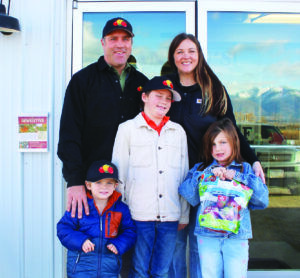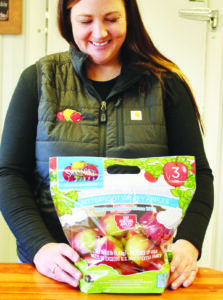
by Michael Howell
The new managers of Swanson’s Mountain View Orchard northeast of Corvallis, Kendall and Ryan Mouw, have a lot of plans for the future. But, according to Kendall, the plans are not their own. Instead of importing a lot of new ideas the couple plans on following the path that they have inherited along with the place. That means paying attention to the sage advice they are getting from Charlie and Julie Swanson, former owners of the historic orchard, and gleaning ideas from the community, from local agencies and institutions and most of all, from the customers themselves, both old and new.
“Charlie and Julie are still so involved with us in the research and the new developments here,” said Kendall. “They are just such wonderful people, willing to share everything they know. We are doing a lot of things that he wanted to do but just didn’t get the chance to see through.”
One thing they are carrying on is the recovery from a major fire blight infestation that wiped out almost half the orchard. They planted over 2,000 new MacIntosh trees last year and plan on planting more.
“We will have to re-plant a large part of the orchard in the next few years and that will be our next big challenge,” said Kendall. “It will boost our production because old trees don’t produce as much as young ones.”
The couple have different but complementary backgrounds and experience and have sort of split the duties involved in the business. Before moving here, Ryan was a dairy farmer in Wisconsin and he handles most of the operational aspects of the orchard business, helping to increase efficiency in the operation, quality production and safety concerns. Kendall worked in financing in California and Wisconsin, handling a billion dollars in finances for large agricultural operations. She slipped easily into the role of handling the marketing and sales aspect of the orchard.

It is a small-scale operation compared to many of the large growers in Washington state, but not so small in terms of the Bitterroot, with about 8,500 trees. They grow about 20 different varieties of apples, but 90% of the orchard accounting for most of the bulk sales are MacIntosh, Empire and Spartan.
“Washington has a lot of good quality apples but they sit in coolers and freezers for six months. We have fresh apples and fresh cider,” said Kindall.
The relatively small number of trees of so many different varieties makes for an interesting and exciting early season which the Mouws pretty much handle. A lot of them are early ripeners. But in late September when the bulk of the apples – the Macs, Empires and Spartans – start to ripen, they have a crew come in from Washington state to help out. They can pick up to 350,000 pounds of apples in 10 days.
In the very early days of the orchard, people could come and pick up the windfalls for a reduced price. But health concerns and insurance companies put a stop to that. The Mouws now use farm animals to clean up the orchard grounds and you can often see their Kune Kune pigs roaming the orchard and munching down on the fallen apples. They have also recently purchased a windfall harvester. There is very little waste in the whole operation. Using the windfall harvester, they can feed their pigs, and some miniature cattle, apples for about six months out of the year. They also feed the mushy pulp called pumice left over from pressing the apples into cider to the animals. According to Ryan, the meat tastes sweeter from all the apples in their diet and they plan on integrating a small amount of meat sales into their operation, maybe five steers and some pork.
Making cider is a big part of the operation and they have already produced 5,000 gallons for sale this year and the total will probably reach about 8,000 gallons by the end of the season. They also recently announced last month a new partnership with Western Cider where they are the primary grower for their McIntosh hard cider. Western Cider will be pressing their MacIntosh
apples at Swanson’s orchard in November.
One customer-produced idea is to add apple cider donuts to their store, which they hope to do next year and a longer-term plan is to add a distillery and produce their own apple cider brandy. They are interested in integrating other value-added products from around the valley into their store as well.
One of the most exciting additions to the operation was the introduction of a three-pound ‘grab bag’ to the market this year. Ryan said that in the old days a lot of people bought a lot of apples, two or three bushels at a time, and did a lot of cooking and canning. These days the market has shifted and there are many more people just looking for a small number of apples to eat. These new 3-lb. bags are feeding into that market at an exciting rate.
Community involvement has always been a part of the orchard, according to Kendall. “During our first annual U-pick days that we held this season, we had over 300 families come to our farm,” she said. “Julie was always very supportive of the kids and the schools in the valley. She was a teacher. So, we are doing things they planted the seeds for.” This year they hosted about 15 field trips for kids to tour the farm and are pushing hard to expand the farm-to-school sales part of the operation.
With the help of Grace Nichols, program manager focusing on Specialty Crop Business Development at Ravalli County Economic Development Authority, the Mouws recently held a meet-and-greet at the farm with presentations by representatives from the Office of Public Instruction, Montana Team Nutrition and the National Center for Appropriate Technology, attended by 16 representatives of families and schools throughout the state in an effort to boost their farm-to school sales.
They currently sell apples to a long list of stores including eight in the Bitterroot Valley, six in Missoula and other stores in Butte, Bozeman, Polson, Ronan, St. Ignatius, Deer Lodge, Kalispell, Billings, Lewiston, Belgrade, Dillon, Whitefish and Columbia Falls. They make farm-to-school deliveries to schools in Hamilton, Whitefish, Kalispell, Ronan, St. Ignatius, Missoula, Billings, Hardin and Livingston. As a result of their recent meet-and-greet, they have new accounts in Helena, Evergreen Kids Corner in Hamilton and the University of Montana.